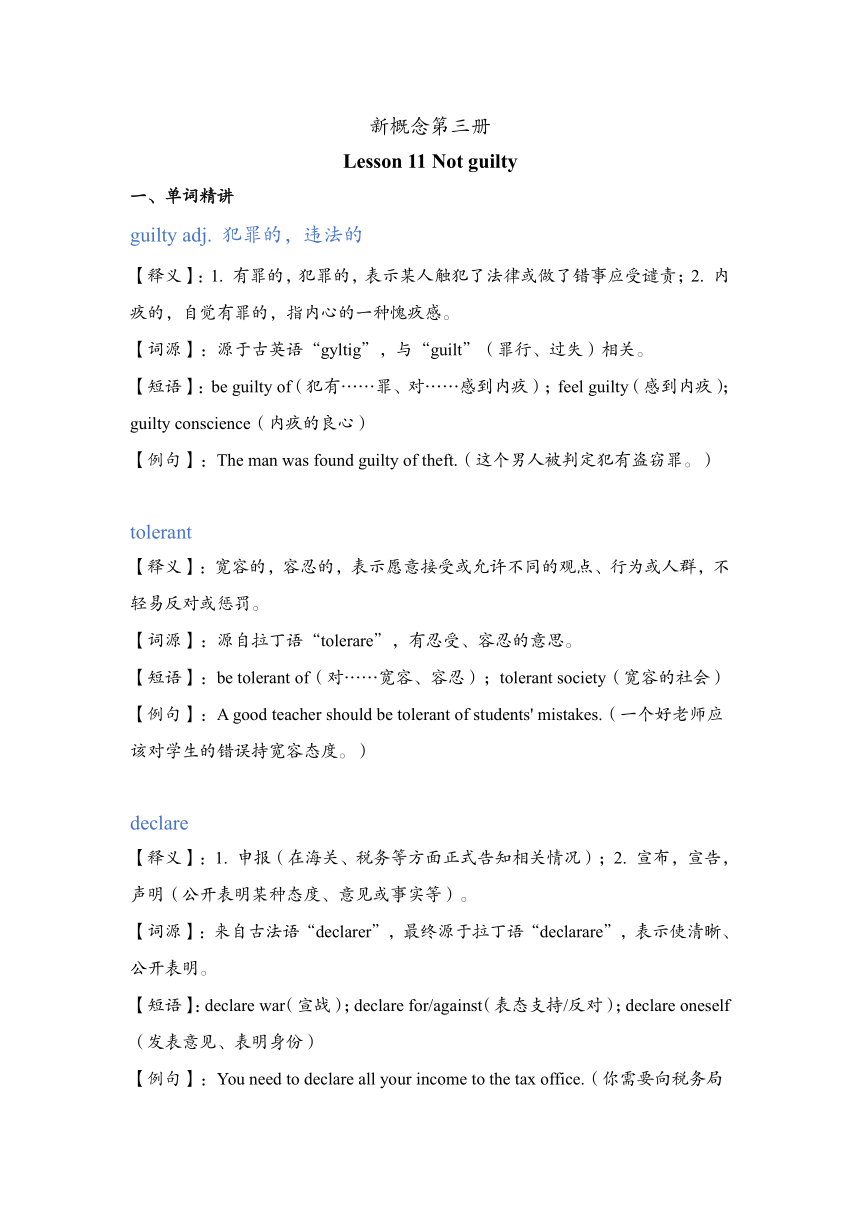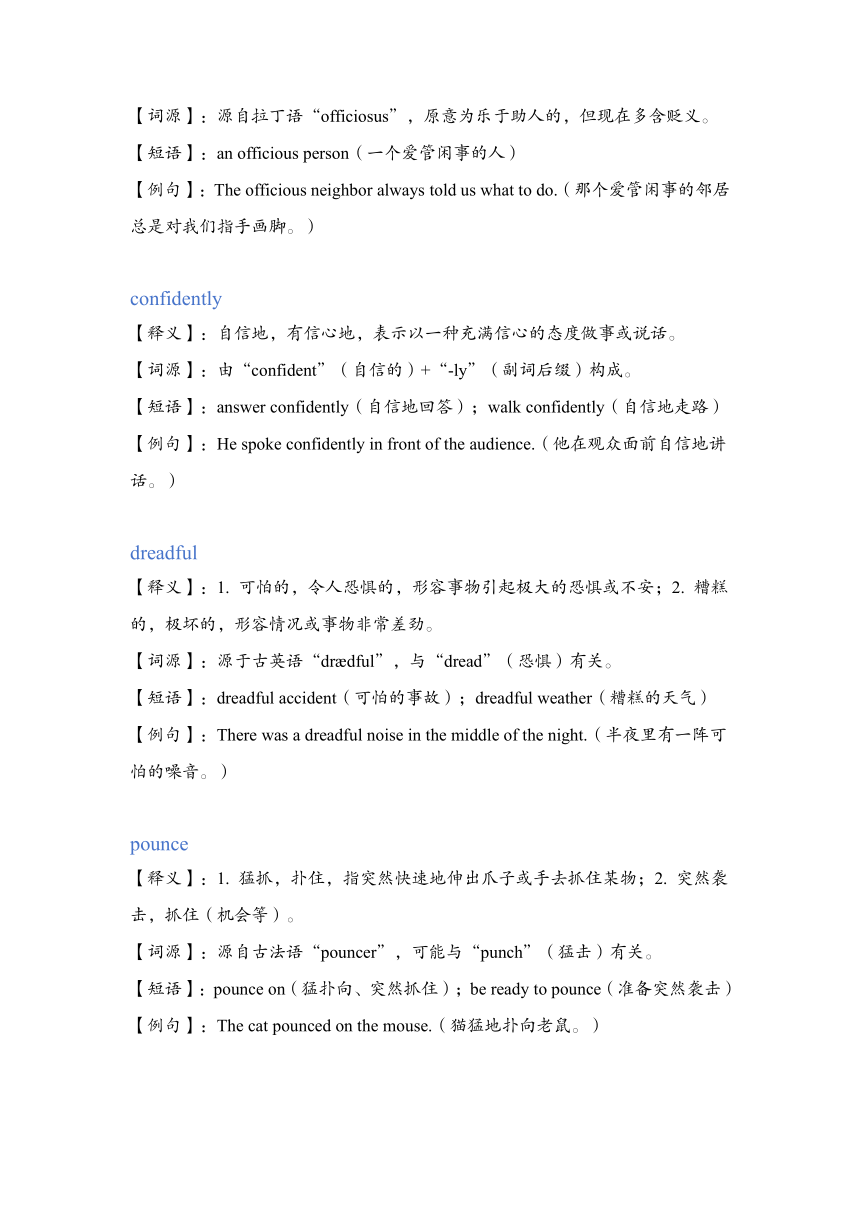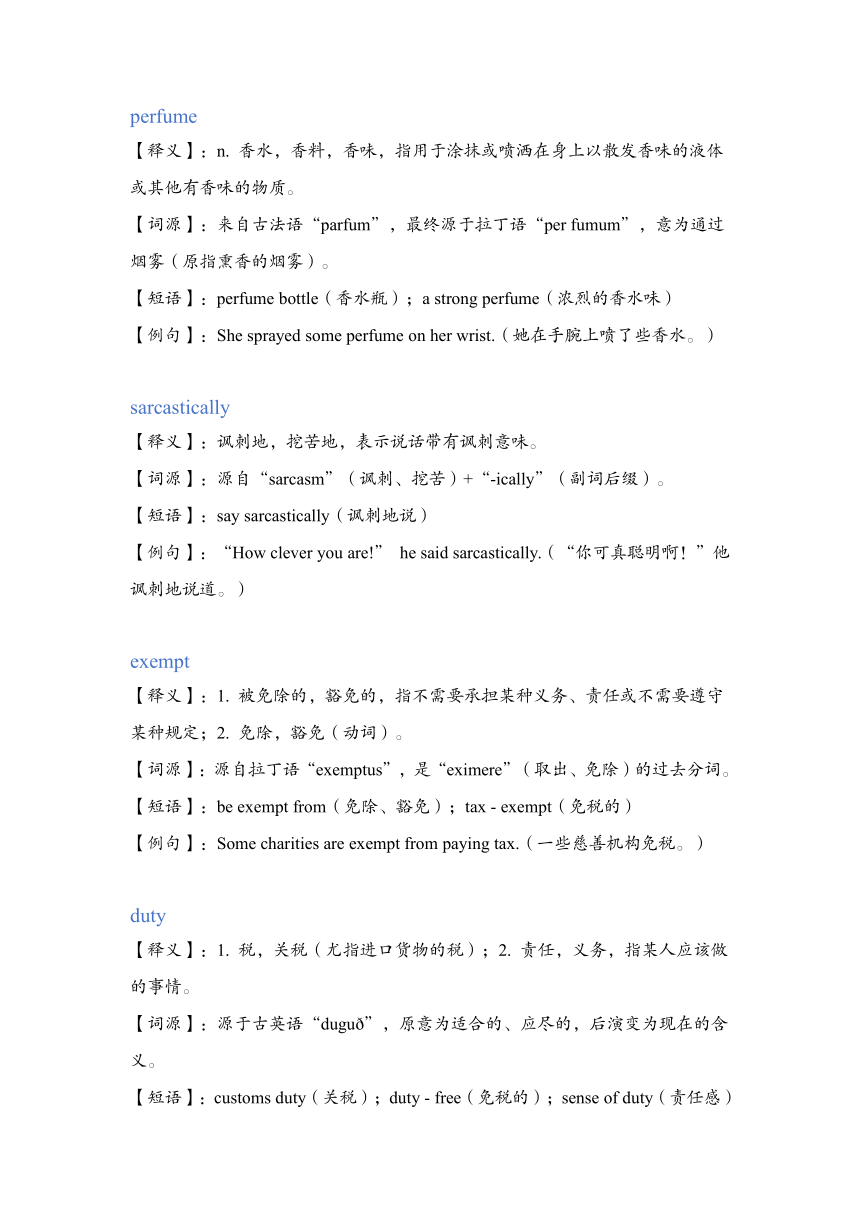新概念第三册Lesson 11 Not guilty讲义
文档属性
| 名称 | 新概念第三册Lesson 11 Not guilty讲义 |

|
|
| 格式 | docx | ||
| 文件大小 | 357.1KB | ||
| 资源类型 | 教案 | ||
| 版本资源 | 新概念英语 | ||
| 科目 | 英语 | ||
| 更新时间 | 2024-12-04 00:00:00 | ||
图片预览





文档简介
新概念第三册
Lesson 11 Not guilty
单词精讲
guilty adj. 犯罪的,违法的
【释义】:1. 有罪的,犯罪的,表示某人触犯了法律或做了错事应受谴责;2. 内疚的,自觉有罪的,指内心的一种愧疚感。
【词源】:源于古英语“gyltig”,与“guilt”(罪行、过失)相关。
【短语】:be guilty of(犯有……罪、对……感到内疚);feel guilty(感到内疚);guilty conscience(内疚的良心)
【例句】:The man was found guilty of theft.(这个男人被判定犯有盗窃罪。)
tolerant
【释义】:宽容的,容忍的,表示愿意接受或允许不同的观点、行为或人群,不轻易反对或惩罚。
【词源】:源自拉丁语“tolerare”,有忍受、容忍的意思。
【短语】:be tolerant of(对……宽容、容忍);tolerant society(宽容的社会)
【例句】:A good teacher should be tolerant of students' mistakes.(一个好老师应该对学生的错误持宽容态度。)
declare
【释义】:1. 申报(在海关、税务等方面正式告知相关情况);2. 宣布,宣告,声明(公开表明某种态度、意见或事实等)。
【词源】:来自古法语“declarer”,最终源于拉丁语“declarare”,表示使清晰、公开表明。
【短语】:declare war(宣战);declare for/against(表态支持/反对);declare oneself(发表意见、表明身份)
【例句】:You need to declare all your income to the tax office.(你需要向税务局申报你所有的收入。)
hardened
【释义】:1. 有经验的,老练的,通常指在困难或不良环境中经过磨练而变得坚强、不易受影响;2. 变硬的,硬化的(本义,如物体的物理性质)。
【词源】:由“harden”(使变硬、使坚强)的过去分词形式演变而来。
【短语】:hardened criminal(惯犯、老练的罪犯);hardened steel(淬火钢)
【例句】:He is a hardened journalist who has covered many big events.(他是一位经验丰富的记者,报道过许多重大事件。)
professional
【释义】:1. 职业的,专业的,与职业相关或具有专业水平的;2. 专业人士,内行。
【词源】:源于拉丁语“professio”,表示公开声明、职业。
【短语】:professional athlete(职业运动员);professional knowledge(专业知识);professional service(专业服务)
【例句】:She is a professional dancer.(她是一名职业舞者。)
smuggler
【释义】:走私者,走私犯,指非法运输货物(如毒品、珍稀物品等)越过边境或逃避关税的人。
【词源】:来自“smuggle”(走私)+“-er”(表示人)。
【短语】:drug smuggler(毒品走私者);smuggler's route(走私路线)
【例句】:The police caught the smuggler at the border.(警察在边境抓住了走私者。)
officious
【释义】:爱管闲事的,好指使人的,指过度热心、喜欢干涉他人事务且通常不被欢迎的行为。
【词源】:源自拉丁语“officiosus”,原意为乐于助人的,但现在多含贬义。
【短语】:an officious person(一个爱管闲事的人)
【例句】:The officious neighbor always told us what to do.(那个爱管闲事的邻居总是对我们指手画脚。)
confidently
【释义】:自信地,有信心地,表示以一种充满信心的态度做事或说话。
【词源】:由“confident”(自信的)+“-ly”(副词后缀)构成。
【短语】:answer confidently(自信地回答);walk confidently(自信地走路)
【例句】:He spoke confidently in front of the audience.(他在观众面前自信地讲话。)
dreadful
【释义】:1. 可怕的,令人恐惧的,形容事物引起极大的恐惧或不安;2. 糟糕的,极坏的,形容情况或事物非常差劲。
【词源】:源于古英语“dr dful”,与“dread”(恐惧)有关。
【短语】:dreadful accident(可怕的事故);dreadful weather(糟糕的天气)
【例句】:There was a dreadful noise in the middle of the night.(半夜里有一阵可怕的噪音。)
pounce
【释义】:1. 猛抓,扑住,指突然快速地伸出爪子或手去抓住某物;2. 突然袭击,抓住(机会等)。
【词源】:源自古法语“pouncer”,可能与“punch”(猛击)有关。
【短语】:pounce on(猛扑向、突然抓住);be ready to pounce(准备突然袭击)
【例句】:The cat pounced on the mouse.(猫猛地扑向老鼠。)
perfume
【释义】:n. 香水,香料,香味,指用于涂抹或喷洒在身上以散发香味的液体或其他有香味的物质。
【词源】:来自古法语“parfum”,最终源于拉丁语“per fumum”,意为通过烟雾(原指熏香的烟雾)。
【短语】:perfume bottle(香水瓶);a strong perfume(浓烈的香水味)
【例句】:She sprayed some perfume on her wrist.(她在手腕上喷了些香水。)
sarcastically
【释义】:讽刺地,挖苦地,表示说话带有讽刺意味。
【词源】:源自“sarcasm”(讽刺、挖苦)+“-ically”(副词后缀)。
【短语】:say sarcastically(讽刺地说)
【例句】:“How clever you are!” he said sarcastically.(“你可真聪明啊!”他讽刺地说道。)
exempt
【释义】:1. 被免除的,豁免的,指不需要承担某种义务、责任或不需要遵守某种规定;2. 免除,豁免(动词)。
【词源】:源自拉丁语“exemptus”,是“eximere”(取出、免除)的过去分词。
【短语】:be exempt from(免除、豁免);tax - exempt(免税的)
【例句】:Some charities are exempt from paying tax.(一些慈善机构免税。)
duty
【释义】:1. 税,关税(尤指进口货物的税);2. 责任,义务,指某人应该做的事情。
【词源】:源于古英语“dugu ”,原意为适合的、应尽的,后演变为现在的含义。
【短语】:customs duty(关税);duty - free(免税的);sense of duty(责任感)
【例句】:You have to pay duty on these imported goods.(你得为这些进口货物缴税。)
gel
【释义】:n. 凝胶,冻胶,一种半固体状、具有粘性的物质。
【词源】:可能是“jelly”(果冻)的缩写形式。
【短语】:hair gel(发胶);gelatin gel(明胶凝胶)
【例句】:He put some gel in his hair to make it look neat.(他在头发上抹了些发胶让头发看起来整洁。)
mixture
【释义】:n. 混合物,混合体,指由两种或多种物质混合在一起形成的东西。
【词源】:源自拉丁语“mixtura”,由“miscere”(混合)派生而来。
【短语】:chemical mixture(化学混合物);a mixture of(……的混合物)
【例句】:Air is a mixture of gases.(空气是多种气体的混合物。)
unscrew
【释义】:v. 拧开,旋松,与“screw”(拧、旋紧)相反,指通过旋转将螺丝、瓶盖等拧下来。
【词源】:由“un -”(表示相反动作)+“screw”构成。
【短语】:unscrew the cap(拧开盖子)
【例句】:Please unscrew the bottle top.(请拧开瓶盖。)
nostril
【释义】:n. 鼻孔,是鼻子呼吸的孔道。
【词源】:源于古英语“nosthyrl”,由“nosu”(鼻子)+“thyrel”(孔、洞)组成。
【短语】:flare of the nostrils(鼻翼扇动)
【例句】:The smell made his nostrils twitch.(这种气味使他的鼻孔抽动。)
chalk
【释义】:n. 粉笔,一种白色或彩色的、用于在黑板上书写的物质。
【词源】:源自古英语“cealc”。
【短语】:a piece of chalk(一支粉笔);chalk board(黑板)
【例句】:The teacher wrote on the blackboard with a piece of chalk.(老师用一支粉笔在黑板上写字。)
baggage
【释义】:n. 行李,指旅行者携带的衣物、箱子等物品。
【词源】:来自古法语“bagage”,与“bag”(包、袋)有关。
【短语】:baggage claim(行李领取处);carry one's baggage(携带某人的行李)
【例句】:He checked his baggage at the airport.(他在机场托运行李。)
二、课文精讲
1.but they can still stop you when you are going through the Green Channel and have nothing to declare.但是,当你通过绿色通道,没有任何东西需要申报时,他们仍可以拦住你。
the Green Channel,绿色通道,指海关专供没有携带征税物品进关的旅客所走的通道。
the Green Channel=the Custom Office
2.Even really honest people are often made to feel guilty.甚至是最诚实的人也常弄得觉得有罪似的.
(1) 我们在运用形容词、动词时,往往需要用副词来强调
a) 表示“真正的”really
a really officious person
b)强调“特别,尤其是”particularly
a particularly officious young Customs
officer...
c)强调“绝对的”absolutely
d)强调“完全的,彻底的”
completely,entirely,fully,thoroughly
e)强调“特别,特别是”extremely
f)fairly 强调“一般般”
A fairly good book.
g)very 语气程度强烈“非常”
h)rahter 语意程度接近fairly,注意修饰形容词和副词特别是修饰形容词同时修饰名词时,不定冠词的位置
A rather good book/Rather a good book
j) quite---~right/wrong/mistaken/sure
(2)make,have,let及感官性动词see,hear,notice,feel 用于主动语态,符合宾语不定式的to符号应该省略,但这种结构改成被动式时,不定式符号必须还原
We heard someone come up the stairs
Someone was heard to come up the stairs
3. The hardened professional smuggler, on the other hand, is never troubled by such feelings, even if he has five hundred gold watches hidden in his suitcase.而老练的职业走私犯却即使在手提箱里藏着500只金表,却也处之泰然。
(1) (on the one hand...)on the other hand
On the one hand we could stay and help you,
but on the other hand it might be better if you went to help him instead
(2)hidden in his suitcase是过去分词短语作定语,修饰watches,它相当于一个定语从句:which were hidden in his suitcase.
4.'Have you anything to declare ' he asked, looking me in the eye.“您有什么需要申报的吗 ”他直盯着我的眼睛问。
looking me in the eye,直盯着我的眼睛,这是分词短语作状语,表示方式,修饰 asked。
look sb.in the face,stare sb.in the eys
=look directly at sb.
Not one of the men dared look him in the eye.
5 'Would you mind unlocking this suitcase, please '“请打开这只手提箱好吗 ”
mind+doing
6.The Officer went through the case with great care.那位官员十分仔细地把箱子检查了一遍。
The Officer went through the case with great care.
=The Officer examined the case carefully
with great care……强调相当的仔细
go through “检查”
7.All the things I had packed so carefully were soon in a dreadful mess.所有细心包装好的东西一会儿工夫就乱成一团。
in a mess: 乱作一团
in a dreadful mess (或 in a mess)
乱七八糟,混乱透了。
介词in 和名词搭配,表示一种状态
秩序井然;in good order
身体健康:in good health
心境好:in a good mood
脾气好:in a good temper
8.'You should have declared that. Perfume is not exempt from import duty.'“你刚才应该申报,香水要上进口税的。”
You should have declared that.你早该申报了。
should have和过去分词搭配,表示本应该做某事却没有做,具有谴责性的味道
You should have arrived here five minutes earlier.
You should have told me about it.
本不应该做某事:shouldn't have done
be exempt from 作“免除”、“豁免”解。
exempt: 免除的,被免除的 be~from
Drinks are not exempt from import duty.
10.Suddenly, I saw the Officer's face light up.突然,我看到官员脸上露出了得意的神色。
light up:喜气洋洋,容光焕发
Masha's face lit up when she saw her old friend.
His face lighted up at the small triumph.
Tom really lighted up when he saw the new bicycle.
light过去式,过去分词:lit,lighted
但是如果运用过去分词作定语,表示被动点燃的,要用lighted
一支被点燃的雪茄:a lighted cigar
点燃的火炬:a lighted stick
11.He had spotted a tiny bottle at the bottom of my case and he pounced on it with delight.他在我的箱底发现了一只小瓶,高兴地一把抓了起来。
介词短语---with delight“欣喜若狂地”
with和抽象名词搭配,表示内心充满了一种感情
自信地:with confidence
细心地:with care
骄傲地:with pride
欣喜若狂地:with delight
12.He had spotted a tiny bottle at the bottom of my case and he pounced on it with delight.他在我的箱底发现了一只小瓶,高兴地一把抓了起来。
pounce on :向...猛扑过去,对...大作文章
The policeman pounced on the thief.
Don't pounce on my mistake.
13.As I expected, he did not believe me.果不出所料,他并不相信我。
as……关系代词,引导非限制性定语从句,他所指代的内容就是主句的整个句子的含义,
As we know,the earth is round(众所周知)
As Brian pointed out,...(正如...所指出的)
正如...所提及的:as sb.mentioned
正如我很快得知的:as I soon learned
关系代词as和which的区别:
as所引导的非限制性定语从句,可用在主句之前。
which引导的非限制性定语从句,只能用在主句之后
14. 'Try it!' I said encouragingly.“你就闻一闻吧!”我催促说。
副词形式:encouragingly
He was greeted by an unpleasant smell..
15.He was greeted by an unpleasant smell which convinced him that I was telling the truth.一股怪味袭来,使他相信了我说的真话。
greet: 问候,向...致意;觉察到,呈现在...眼前,在...耳边
I woke up and was greeted by a bird's song.
Inside the room a dreaduful mess greeted us.
When he went into the kitchen,a smell greeted him.
Lesson 11 Not guilty
单词精讲
guilty adj. 犯罪的,违法的
【释义】:1. 有罪的,犯罪的,表示某人触犯了法律或做了错事应受谴责;2. 内疚的,自觉有罪的,指内心的一种愧疚感。
【词源】:源于古英语“gyltig”,与“guilt”(罪行、过失)相关。
【短语】:be guilty of(犯有……罪、对……感到内疚);feel guilty(感到内疚);guilty conscience(内疚的良心)
【例句】:The man was found guilty of theft.(这个男人被判定犯有盗窃罪。)
tolerant
【释义】:宽容的,容忍的,表示愿意接受或允许不同的观点、行为或人群,不轻易反对或惩罚。
【词源】:源自拉丁语“tolerare”,有忍受、容忍的意思。
【短语】:be tolerant of(对……宽容、容忍);tolerant society(宽容的社会)
【例句】:A good teacher should be tolerant of students' mistakes.(一个好老师应该对学生的错误持宽容态度。)
declare
【释义】:1. 申报(在海关、税务等方面正式告知相关情况);2. 宣布,宣告,声明(公开表明某种态度、意见或事实等)。
【词源】:来自古法语“declarer”,最终源于拉丁语“declarare”,表示使清晰、公开表明。
【短语】:declare war(宣战);declare for/against(表态支持/反对);declare oneself(发表意见、表明身份)
【例句】:You need to declare all your income to the tax office.(你需要向税务局申报你所有的收入。)
hardened
【释义】:1. 有经验的,老练的,通常指在困难或不良环境中经过磨练而变得坚强、不易受影响;2. 变硬的,硬化的(本义,如物体的物理性质)。
【词源】:由“harden”(使变硬、使坚强)的过去分词形式演变而来。
【短语】:hardened criminal(惯犯、老练的罪犯);hardened steel(淬火钢)
【例句】:He is a hardened journalist who has covered many big events.(他是一位经验丰富的记者,报道过许多重大事件。)
professional
【释义】:1. 职业的,专业的,与职业相关或具有专业水平的;2. 专业人士,内行。
【词源】:源于拉丁语“professio”,表示公开声明、职业。
【短语】:professional athlete(职业运动员);professional knowledge(专业知识);professional service(专业服务)
【例句】:She is a professional dancer.(她是一名职业舞者。)
smuggler
【释义】:走私者,走私犯,指非法运输货物(如毒品、珍稀物品等)越过边境或逃避关税的人。
【词源】:来自“smuggle”(走私)+“-er”(表示人)。
【短语】:drug smuggler(毒品走私者);smuggler's route(走私路线)
【例句】:The police caught the smuggler at the border.(警察在边境抓住了走私者。)
officious
【释义】:爱管闲事的,好指使人的,指过度热心、喜欢干涉他人事务且通常不被欢迎的行为。
【词源】:源自拉丁语“officiosus”,原意为乐于助人的,但现在多含贬义。
【短语】:an officious person(一个爱管闲事的人)
【例句】:The officious neighbor always told us what to do.(那个爱管闲事的邻居总是对我们指手画脚。)
confidently
【释义】:自信地,有信心地,表示以一种充满信心的态度做事或说话。
【词源】:由“confident”(自信的)+“-ly”(副词后缀)构成。
【短语】:answer confidently(自信地回答);walk confidently(自信地走路)
【例句】:He spoke confidently in front of the audience.(他在观众面前自信地讲话。)
dreadful
【释义】:1. 可怕的,令人恐惧的,形容事物引起极大的恐惧或不安;2. 糟糕的,极坏的,形容情况或事物非常差劲。
【词源】:源于古英语“dr dful”,与“dread”(恐惧)有关。
【短语】:dreadful accident(可怕的事故);dreadful weather(糟糕的天气)
【例句】:There was a dreadful noise in the middle of the night.(半夜里有一阵可怕的噪音。)
pounce
【释义】:1. 猛抓,扑住,指突然快速地伸出爪子或手去抓住某物;2. 突然袭击,抓住(机会等)。
【词源】:源自古法语“pouncer”,可能与“punch”(猛击)有关。
【短语】:pounce on(猛扑向、突然抓住);be ready to pounce(准备突然袭击)
【例句】:The cat pounced on the mouse.(猫猛地扑向老鼠。)
perfume
【释义】:n. 香水,香料,香味,指用于涂抹或喷洒在身上以散发香味的液体或其他有香味的物质。
【词源】:来自古法语“parfum”,最终源于拉丁语“per fumum”,意为通过烟雾(原指熏香的烟雾)。
【短语】:perfume bottle(香水瓶);a strong perfume(浓烈的香水味)
【例句】:She sprayed some perfume on her wrist.(她在手腕上喷了些香水。)
sarcastically
【释义】:讽刺地,挖苦地,表示说话带有讽刺意味。
【词源】:源自“sarcasm”(讽刺、挖苦)+“-ically”(副词后缀)。
【短语】:say sarcastically(讽刺地说)
【例句】:“How clever you are!” he said sarcastically.(“你可真聪明啊!”他讽刺地说道。)
exempt
【释义】:1. 被免除的,豁免的,指不需要承担某种义务、责任或不需要遵守某种规定;2. 免除,豁免(动词)。
【词源】:源自拉丁语“exemptus”,是“eximere”(取出、免除)的过去分词。
【短语】:be exempt from(免除、豁免);tax - exempt(免税的)
【例句】:Some charities are exempt from paying tax.(一些慈善机构免税。)
duty
【释义】:1. 税,关税(尤指进口货物的税);2. 责任,义务,指某人应该做的事情。
【词源】:源于古英语“dugu ”,原意为适合的、应尽的,后演变为现在的含义。
【短语】:customs duty(关税);duty - free(免税的);sense of duty(责任感)
【例句】:You have to pay duty on these imported goods.(你得为这些进口货物缴税。)
gel
【释义】:n. 凝胶,冻胶,一种半固体状、具有粘性的物质。
【词源】:可能是“jelly”(果冻)的缩写形式。
【短语】:hair gel(发胶);gelatin gel(明胶凝胶)
【例句】:He put some gel in his hair to make it look neat.(他在头发上抹了些发胶让头发看起来整洁。)
mixture
【释义】:n. 混合物,混合体,指由两种或多种物质混合在一起形成的东西。
【词源】:源自拉丁语“mixtura”,由“miscere”(混合)派生而来。
【短语】:chemical mixture(化学混合物);a mixture of(……的混合物)
【例句】:Air is a mixture of gases.(空气是多种气体的混合物。)
unscrew
【释义】:v. 拧开,旋松,与“screw”(拧、旋紧)相反,指通过旋转将螺丝、瓶盖等拧下来。
【词源】:由“un -”(表示相反动作)+“screw”构成。
【短语】:unscrew the cap(拧开盖子)
【例句】:Please unscrew the bottle top.(请拧开瓶盖。)
nostril
【释义】:n. 鼻孔,是鼻子呼吸的孔道。
【词源】:源于古英语“nosthyrl”,由“nosu”(鼻子)+“thyrel”(孔、洞)组成。
【短语】:flare of the nostrils(鼻翼扇动)
【例句】:The smell made his nostrils twitch.(这种气味使他的鼻孔抽动。)
chalk
【释义】:n. 粉笔,一种白色或彩色的、用于在黑板上书写的物质。
【词源】:源自古英语“cealc”。
【短语】:a piece of chalk(一支粉笔);chalk board(黑板)
【例句】:The teacher wrote on the blackboard with a piece of chalk.(老师用一支粉笔在黑板上写字。)
baggage
【释义】:n. 行李,指旅行者携带的衣物、箱子等物品。
【词源】:来自古法语“bagage”,与“bag”(包、袋)有关。
【短语】:baggage claim(行李领取处);carry one's baggage(携带某人的行李)
【例句】:He checked his baggage at the airport.(他在机场托运行李。)
二、课文精讲
1.but they can still stop you when you are going through the Green Channel and have nothing to declare.但是,当你通过绿色通道,没有任何东西需要申报时,他们仍可以拦住你。
the Green Channel,绿色通道,指海关专供没有携带征税物品进关的旅客所走的通道。
the Green Channel=the Custom Office
2.Even really honest people are often made to feel guilty.甚至是最诚实的人也常弄得觉得有罪似的.
(1) 我们在运用形容词、动词时,往往需要用副词来强调
a) 表示“真正的”really
a really officious person
b)强调“特别,尤其是”particularly
a particularly officious young Customs
officer...
c)强调“绝对的”absolutely
d)强调“完全的,彻底的”
completely,entirely,fully,thoroughly
e)强调“特别,特别是”extremely
f)fairly 强调“一般般”
A fairly good book.
g)very 语气程度强烈“非常”
h)rahter 语意程度接近fairly,注意修饰形容词和副词特别是修饰形容词同时修饰名词时,不定冠词的位置
A rather good book/Rather a good book
j) quite---~right/wrong/mistaken/sure
(2)make,have,let及感官性动词see,hear,notice,feel 用于主动语态,符合宾语不定式的to符号应该省略,但这种结构改成被动式时,不定式符号必须还原
We heard someone come up the stairs
Someone was heard to come up the stairs
3. The hardened professional smuggler, on the other hand, is never troubled by such feelings, even if he has five hundred gold watches hidden in his suitcase.而老练的职业走私犯却即使在手提箱里藏着500只金表,却也处之泰然。
(1) (on the one hand...)on the other hand
On the one hand we could stay and help you,
but on the other hand it might be better if you went to help him instead
(2)hidden in his suitcase是过去分词短语作定语,修饰watches,它相当于一个定语从句:which were hidden in his suitcase.
4.'Have you anything to declare ' he asked, looking me in the eye.“您有什么需要申报的吗 ”他直盯着我的眼睛问。
looking me in the eye,直盯着我的眼睛,这是分词短语作状语,表示方式,修饰 asked。
look sb.in the face,stare sb.in the eys
=look directly at sb.
Not one of the men dared look him in the eye.
5 'Would you mind unlocking this suitcase, please '“请打开这只手提箱好吗 ”
mind+doing
6.The Officer went through the case with great care.那位官员十分仔细地把箱子检查了一遍。
The Officer went through the case with great care.
=The Officer examined the case carefully
with great care……强调相当的仔细
go through “检查”
7.All the things I had packed so carefully were soon in a dreadful mess.所有细心包装好的东西一会儿工夫就乱成一团。
in a mess: 乱作一团
in a dreadful mess (或 in a mess)
乱七八糟,混乱透了。
介词in 和名词搭配,表示一种状态
秩序井然;in good order
身体健康:in good health
心境好:in a good mood
脾气好:in a good temper
8.'You should have declared that. Perfume is not exempt from import duty.'“你刚才应该申报,香水要上进口税的。”
You should have declared that.你早该申报了。
should have和过去分词搭配,表示本应该做某事却没有做,具有谴责性的味道
You should have arrived here five minutes earlier.
You should have told me about it.
本不应该做某事:shouldn't have done
be exempt from 作“免除”、“豁免”解。
exempt: 免除的,被免除的 be~from
Drinks are not exempt from import duty.
10.Suddenly, I saw the Officer's face light up.突然,我看到官员脸上露出了得意的神色。
light up:喜气洋洋,容光焕发
Masha's face lit up when she saw her old friend.
His face lighted up at the small triumph.
Tom really lighted up when he saw the new bicycle.
light过去式,过去分词:lit,lighted
但是如果运用过去分词作定语,表示被动点燃的,要用lighted
一支被点燃的雪茄:a lighted cigar
点燃的火炬:a lighted stick
11.He had spotted a tiny bottle at the bottom of my case and he pounced on it with delight.他在我的箱底发现了一只小瓶,高兴地一把抓了起来。
介词短语---with delight“欣喜若狂地”
with和抽象名词搭配,表示内心充满了一种感情
自信地:with confidence
细心地:with care
骄傲地:with pride
欣喜若狂地:with delight
12.He had spotted a tiny bottle at the bottom of my case and he pounced on it with delight.他在我的箱底发现了一只小瓶,高兴地一把抓了起来。
pounce on :向...猛扑过去,对...大作文章
The policeman pounced on the thief.
Don't pounce on my mistake.
13.As I expected, he did not believe me.果不出所料,他并不相信我。
as……关系代词,引导非限制性定语从句,他所指代的内容就是主句的整个句子的含义,
As we know,the earth is round(众所周知)
As Brian pointed out,...(正如...所指出的)
正如...所提及的:as sb.mentioned
正如我很快得知的:as I soon learned
关系代词as和which的区别:
as所引导的非限制性定语从句,可用在主句之前。
which引导的非限制性定语从句,只能用在主句之后
14. 'Try it!' I said encouragingly.“你就闻一闻吧!”我催促说。
副词形式:encouragingly
He was greeted by an unpleasant smell..
15.He was greeted by an unpleasant smell which convinced him that I was telling the truth.一股怪味袭来,使他相信了我说的真话。
greet: 问候,向...致意;觉察到,呈现在...眼前,在...耳边
I woke up and was greeted by a bird's song.
Inside the room a dreaduful mess greeted us.
When he went into the kitchen,a smell greeted him.
同课章节目录
